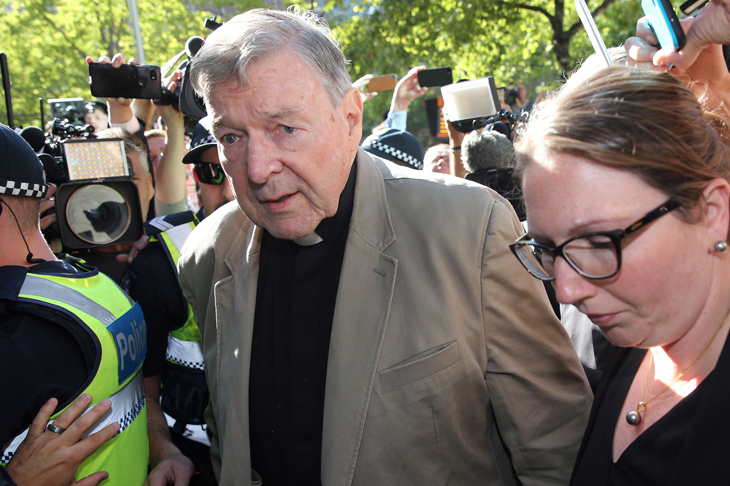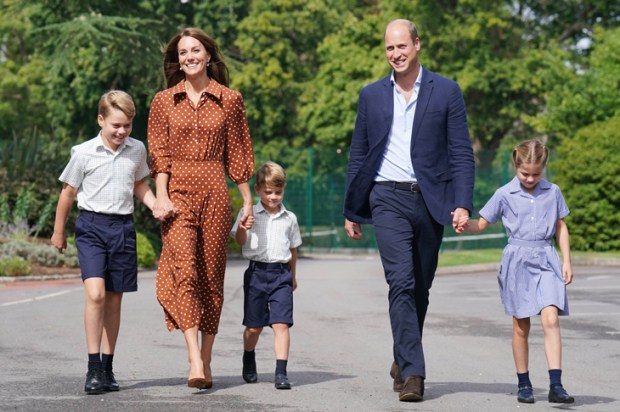Tutoring journalism students in Beijing, a leading Australian editor counselled them not to describe an accused person as ‘guilty’. A student asked, ‘But if he were arrested, wouldn’t he be guilty?’
The rule of law has long prevailed in Australia as in few other countries.
Its manifestations, the presumption of innocence and that guilt be proved beyond reasonable doubt, are under attack. The guilt by accusation brigade, led by #MeToo, insists they be replaced by alien concepts such as ‘(Always) believe the victim’ and ‘Get the villain’. White heterosexual males, Catholic priests, Jewish rabbis and anyone President Trump nominates to the Supreme Court are star candidates for villainy.
In this context, Cardinal Pell’s appeal is crucial not only to him but to the nation. The High Court has the unique opportunity of defending nothing less than the rule of law.
The case had its origins in the Victorian police following the failed British experiment of abandoning the sound practice of acting only on a complaint. Setting up what has been called a ‘Get Pell’ unit and with the ABC and Fairfax running a trial by media, the resulting unprecedented pincer operation would inevitably affect the jury trial they were demanding.
The police trawl eventually produced a complaint by one of two choirboys about sexual abuse in Melbourne’s St Patrick’s Cathedral over twenty years ago. The other choirboy, sadly deceased, told his mother there was no such abuse.
Apart from the complainant’s evidence, with all its inconsistencies and discrepancies and seen only in a video from an earlier mistrial, the only other evidence came from over twenty prosecution witnesses from the Cathedral. This established that at the end of a solemn mass, the Cardinal would go in procession to the main door, staying there to talk to departing parishioners at the very time one of the two offences was alleged to have occurred. Evidence was also given about routines and practices after mass and the robes the Cardinal wore, arguably so heavy and impossible to open that the offence could not have been committed as described.
All this evidence was exculpatory, i.e., favourable to the Cardinal. Nor did the prosecution suggest any witness was untruthful. Inexplicably, they also failed to call a potential key witness, Father Egan, celebrant at the time of the second abuse.
When he was found guilty, the Cardinal appealed to the Victorian Court of Appeal. Justice Mark Weinberg — by far the judge most experienced in criminal law — found that on the whole of the evidence, it was not open to the jury to be satisfied beyond reasonable doubt of the Cardinal’s guilt.
But Chief Justice Anne Ferguson and Justice Chris Maxwell disagreed. They found the complainant so obviously truthful and his evidence so compelling as to eliminate any doubt which would otherwise be raised by the exculpatory evidence.
It was for the Cardinal to establish that any alleged offending was impossible. Hitherto the onus of proof was always on the prosecution; the majority have reversed this.
It is for the High Court to determine whether the law has been so radically changed that sex-abuse complaints are to be treated differently.
Guilt by accusation has implications beyond the criminal law.
Trial by media has long been encouraged by American activist judges surrounding public figures with a defamation-free zone. Hence the regular defamation of President Trump reproduced slavishly in the Australian media on the assumption Americans will not sue elsewhere. That is not guaranteed, as the Daily Mail discovered to its great cost when it grossly defamed the First Lady.
Where a media outlet defending a defamation action in Australia relies on truth, they bear the onus of proving this, but not beyond reasonable doubt. Proof in a civil case need only be on the balance of probabilities. But this was long ago attenuated by the High Court through the ‘Briginshaw’ principle. This is that the more serious the allegation, the more satisfied one must be of its proof.
This principle is the key to the recent Federal Court award to actor Geoffrey Rush of damages close to $4 million over a front-page story in Sydney’s Daily Telegraph alleging sexual abuse.
Unfortunately, the law on this is not so much unsettled; it is in a mess the High Court should correct.
This became apparent in another defamation case, Fleming vs Advertiser, brought by the distinguished bioethicist, prolific writer and founding president of Campion College, the Catholic formerly Anglican priest, Father John Fleming. Adelaide newspapers accused him of criminal sexual misconduct. This was based on complaints investigated by the police but who had declined to prosecute. The publication of these clearly serious accusations have destroyed his career, ruining his life and that of his family.
Arguing the Briginshaw principle, but losing in the lower court, he appealed and lost again in the South Australian Supreme Court in 2016. The Court surprisingly played down Briginshaw, claiming later High Court judgments do not import that presumption into the civil arena and that it was incorrect to raise it to an ‘onus’, ‘standard’ or ‘principle’.
Yet in a subsequent case concerning allegations of fraud and not sex abuse, Poniatowska vs Channel Seven (2019), the same court applied Briginshaw, restoring it to the status of a ‘principle’.
As we saw in the Geoffrey Rush case, this principle is crucial for those accused of sexual abuse. But the High Court has twice inexplicably refused to review Fleming and clean up the confusion.
Not to do so leaves the Court open to the criticism that rather than attending to core functions, it is more interested in producing, as they did recently, constitutional interpretations which would have the founders rolling in their graves.
Got something to add? Join the discussion and comment below.
Get 10 issues for just $10
Subscribe to The Spectator Australia today for the next 10 magazine issues, plus full online access, for just $10.
Guilt By Accusation and Prince Andrew and the celebrated US lawyer Alan Dershowitz was discussed here at: https://www.spectator.com.au/2019/11/guilt-by-association/
You might disagree with half of it, but you’ll enjoy reading all of it. Try your first month for free, then just $2 a week for the remainder of your first year.














Comments
Don't miss out
Join the conversation with other Spectator Australia readers. Subscribe to leave a comment.
SUBSCRIBEAlready a subscriber? Log in